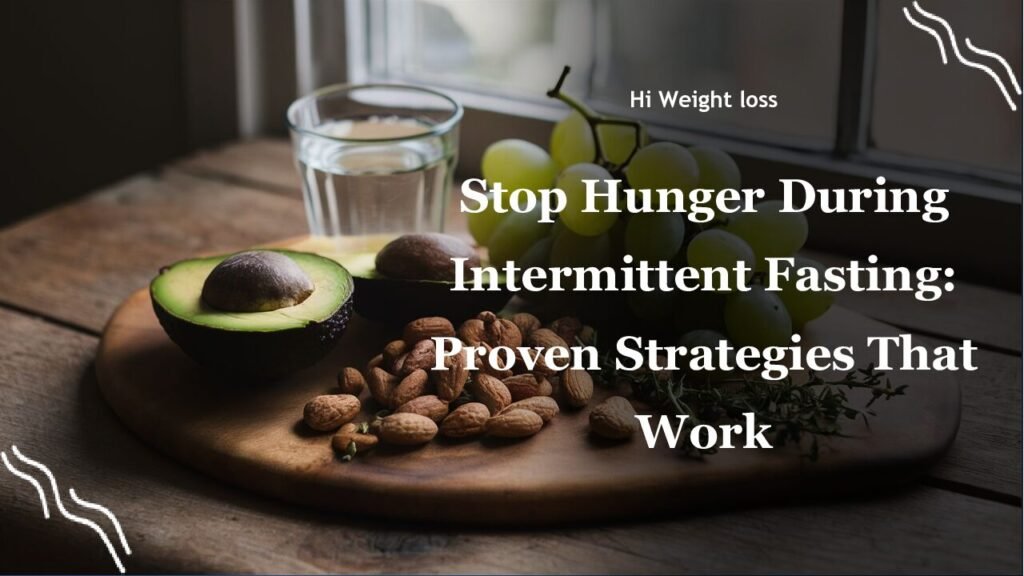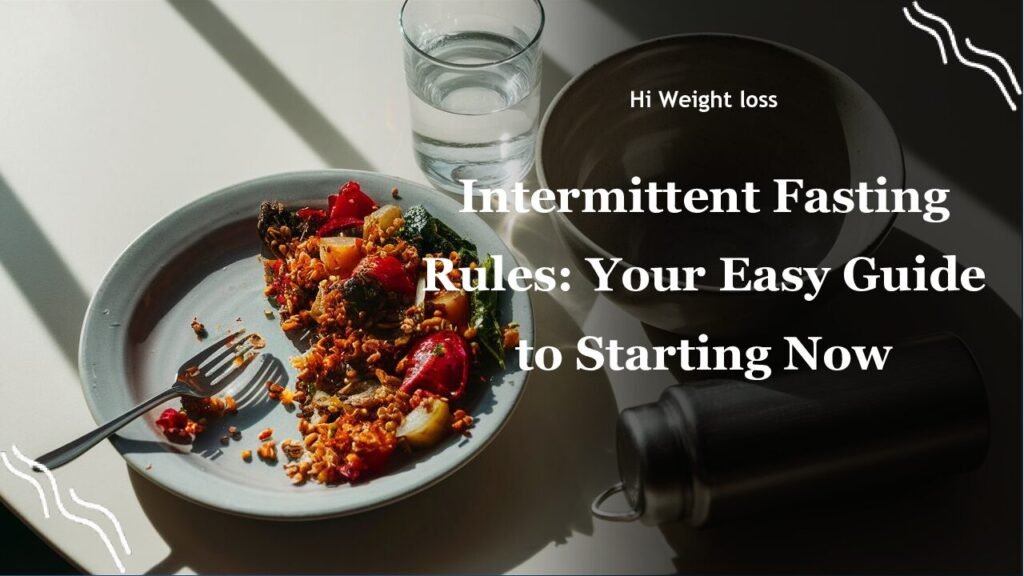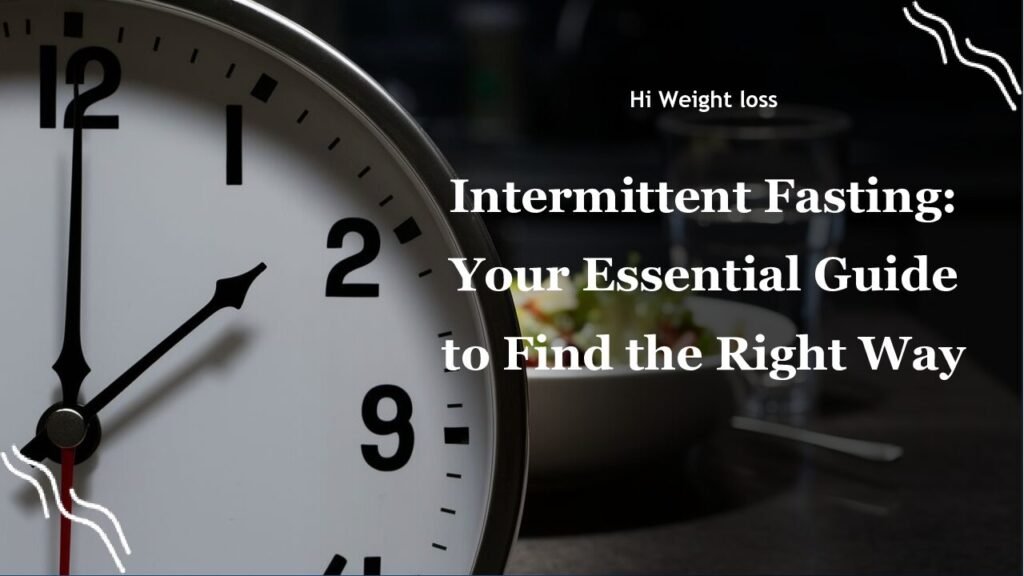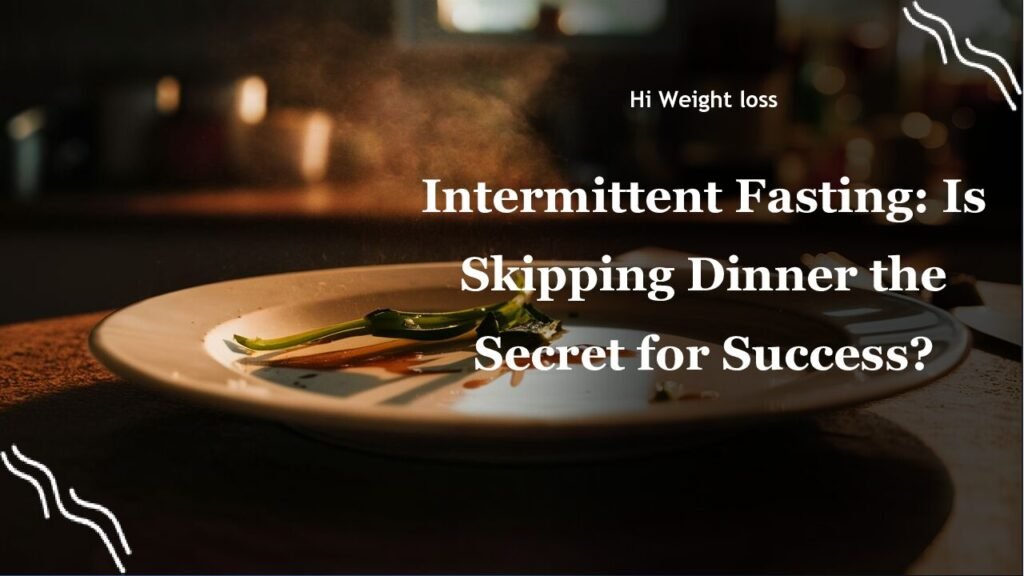“`
Feeling like your stomach is staging a protest during your intermittent fast? It’s a common struggle, that gnawing hunger making it feel like you’re constantly battling your own body. Many of us have been there—I remember trying my first 16:8 fast and thinking I’d never make it past noon! The good news is, you don’t have to suffer through those cravings. This article will explore practical, science-backed strategies to help you manage hunger effectively during intermittent fasting so you can achieve your goals without feeling deprived.
How to Stop Hunger During Intermittent Fasting
The Power of Protein and Healthy Fats
One of the most effective ways to combat hunger during fasting is by focusing on what you eat *during* your eating window. Did you know that “protein is satiating” and helps you feel full? It signals to your brain that you’ve had enough. Similarly, fats take longer to digest, promoting satiety. I’ve noticed that when I prioritize lean proteins like chicken, fish, and tofu, along with healthy fats from avocados and nuts in my meals, the hunger pangs are much more manageable during my fasting period.
Think of it like this: protein and fat are the long-burning fuels that keep your engine running smoothly. Instead of a quick burst and crash like you’d get from sugary snacks, you get sustained energy. So, include foods like chickpeas, pork, beans, shrimp, lentils, and white-flesh fish. Incorporate sources of “monounsaturated and polyunsaturated fatty acids” like avocados, cheese, eggs, salmon, nuts, and seeds. You’ll feel fuller for longer, helping you sail through your fast with ease.
The Refined Carb Trap: Why They Make You Hangry
Ever wonder why you feel ravenous soon after eating a big plate of pasta or a slice of white bread? It’s because refined carbs like white rice, pastries, and pasta have a high glycemic index. These cause a quick spike in your blood sugar, followed by a crash, which triggers intense hunger. It’s a vicious cycle, and believe me, I’ve fallen into it many times. It feels like you just can’t get enough, right?
Instead of those simple carbohydrates, focus on “whole grain carbs” like barley, oats, quinoa, black/brown rice, and whole wheat pasta. They provide a slow and steady release of energy, keeping you feeling satisfied and less likely to experience those intense cravings. Making this shift can make a huge difference in how you feel during your fast.
Hydration is Key: Don’t Mistake Thirst for Hunger
Here’s a simple trick that many people overlook: sometimes, what feels like hunger is actually just dehydration. I know that for me, a glass of water often makes the “hunger pangs” disappear. Drinking more water throughout the day will not only keep you hydrated but can also help reduce those pesky hunger pangs. This is something I’ve tried personally and I can vouch for it.
For a little variety, try sparkling water, which has been shown to increase satiety. It’s a great option if you want something that feels a little more exciting than regular water, and the bubbles can actually help you feel fuller. So, before you reach for a snack, try a glass of water. You might be surprised at how effective it is!
Coffee and Herbal Teas: Your Fasting Allies
Did you know that your morning coffee can be more than just a caffeine boost? Black coffee is actually great at “suppressing appetite”. Caffeine can also contribute to that feeling of fullness. I personally find that a cup of black coffee in the morning helps keep my hunger at bay until lunch during intermittent fasting.
Herbal teas, like green tea, are also great options. They offer the same benefits without breaking your fast. Just be mindful of any additives or flavorings you might use. Keep it simple, and you can enjoy a comforting drink without worrying about disrupting your fasting window. It’s a simple yet effective tool in your fasting arsenal!
The Chewing Trick: Sugar-Free Gum to the Rescue
Here’s a quirky tip you might not have considered: chewing sugar-free gum. It might sound too simple to be true, but it can actually help suppress hunger by affecting those “gut hormones that contribute to hunger”. I remember a friend who swore by this method during her fasting days, and it actually works! When the urge to snack strikes, a piece of sugar-free gum can often do the trick.
It’s a distraction, it’s a bit of something to chew, and it can trick your mind into thinking you’re eating something. The key is to choose sugar-free gum, as sugary options could spike your blood sugar and break your fast. This tiny habit can be surprisingly effective at helping you get through your fast.
Move Your Body: Exercise for Appetite Control
“Exercise can help suppress ghrelin levels”, which is your hunger hormone. It also elevates levels of peptide YY, a hormone that signals fullness. It’s a win-win! When I incorporate regular workouts into my fasting schedule, I find that those hunger pangs are far less intense. The key though, is to schedule them wisely.
High-intensity workouts should ideally be done during your eating window, whereas shorter, low-intensity workouts can be done closer to the end of your fast. By strategically timing your exercise, you can optimize these hormonal benefits and manage hunger more effectively. It’s a great way to combine two healthy habits into one powerful routine.
Sleep and Fasting: A Powerful Combination
Here’s a factor that’s easy to overlook: sleep. Inadequate sleep can wreak havoc on your hunger hormones, causing “disruptions in hormones like ghrelin and leptin”. I’ve noticed that on days I haven’t slept well, my cravings are much more intense. When you’re sleep-deprived, your body may signal it’s hungry, even if it’s not.
Try to align your fasting hours with your sleep schedule. This will minimize the chances of waking up feeling overly hungry. Getting enough rest is essential for overall health and well-being, and it also plays a vital role in making intermittent fasting a much more comfortable experience. Prioritize sleep, and you’ll find your fasts much easier to manage.
Soluble Fiber: Your Secret Weapon
Did you know that “soluble fiber” can also curb hunger without breaking your fast? It works by lowering ghrelin levels and keeping your digestive system busy, even though it isn’t actually digested. I remember when a nutritionist suggested this to me—I was skeptical at first, but it really does make a difference.
Consider incorporating sources of soluble fiber such as acacia fiber into your routine. It gives your digestive system something to work on. While your body cannot digest soluble fiber or get nutrients from it, it makes you feel fuller. This can be particularly helpful during those tougher hours of your fast. It’s like a little extra support for your system, helping you stay on track and feel comfortable.

Putting It All Together
By combining these strategies, you can effectively manage hunger during intermittent fasting. Remember, the key is to find what works best for you and your body. Intermittent fasting is a journey, and it may take time to see what works best for you. You’ll find that as you adopt these strategies, the hunger pangs become more manageable, and your fasting periods become less daunting. You’ll feel more in control and more empowered on your journey.
Here’s a quick recap in a table to help you keep these tips organized:
| Strategy | Description |
|---|---|
| Eat More Protein and Fat | Include lean proteins and healthy fats in your eating window. |
| Eat Fewer Simple Carbs | Prioritize whole grain carbs instead of refined carbohydrates. |
| Stay Hydrated | Drink plenty of water throughout the day, use sparkling water. |
| Drink Coffee and Herbal Teas | Black coffee and herbal teas can suppress appetite. |
| Chew Sugar-Free Gum | Can reduce hunger through its effect on gut hormones. |
| Exercise Regularly | Schedule high-intensity workouts during your eating window and low-intensity towards the end of your fast. |
| Get Enough Sleep | Ensure adequate sleep to regulate hunger hormones. |
| Consume Soluble Fiber | Use soluble fiber to help curb hunger without breaking fast. |
Conclusion
Managing hunger during intermittent fasting doesn’t have to be a constant struggle. By focusing on what you eat during your feeding window, staying hydrated, leveraging the benefits of coffee and tea, and timing your exercise, you can make the process much smoother. Remember to prioritize your sleep and consider adding soluble fiber to your diet. Each of these strategies plays a crucial role in curbing hunger and making fasting more comfortable and sustainable.
The journey of intermittent fasting, just like my initial experience attempting a 16:8 fast, can feel challenging at first. However, with the right techniques and a bit of consistency, you can learn to control your cravings. Implement these tips, be patient with yourself, and remember that progress, not perfection, is the ultimate goal. What’s the next step for you?
Perhaps trying incorporating more protein, or starting with chewing sugar free gum. Share this article to help others who are facing the same challenges!
FAQ
Will intermittent fasting make me lose muscle mass?
When practiced properly, intermittent fasting shouldn’t lead to muscle loss. Make sure you are consuming enough protein during your feeding window. If you have concerns, be sure to consult a healthcare professional.
Can I do intermittent fasting if I have a medical condition?
If you have underlying medical conditions or are taking medications, it is very important to seek advice from your healthcare provider before starting intermittent fasting. They can help you assess the risks and benefits for your specific situation.
Is it normal to feel hungry when first starting intermittent fasting?
Yes, it’s completely normal to experience hunger when you first start intermittent fasting. This sensation usually subsides as your body adapts. Use these tips to help manage that process.
How often should I do intermittent fasting?
The frequency of intermittent fasting can vary based on personal preference and lifestyle. Some people may choose to do it every day, while others may only do it a few times a week. The key is to find a routine that is manageable and consistent.
Can chewing gum during a fast really help curb hunger?
Yes, chewing sugar-free gum between meals may suppress hunger and reduce the desire to eat. This could be due to the effect on gut hormones that contribute to hunger, according to simple.life
“`



